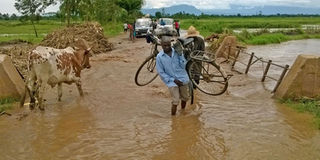Water everywhere, but none for irrigation

The majority of Ugandans spend more time dodging mud and cursing floods. FILE PHOTO
What you need to know:
- The issue: Rainy season.
- Our view: The majority of Ugandans spend more time dodging mud and cursing floods. This should not be the case. With a clear and deliberate policy towards adoption of irrigation, the country would truly earn its name as the bread basket of the region.
Travel across Kampala City on a rainy day is a tricky affair. In fact, travel anywhere in the country in the wet season can prove a menace. Trading centres are muddy and the streets filled with pools and puddles of water. Upcountry, rivers threaten to burst their banks and flood roads. In some cases, they do, disrupting village and town life. Trucks carrying produce get stuck in the mud and school children have to swim or wade across. When it rains, there is water everywhere! Without a plan, water becomes a destructive force of the kind which ruins our towns, bridges and village roads every rainy season.
Water is life and having it in abundance should be a good thing. Areas around Lake Victoria receive the highest average annual rainfall of 1,200 to 2,000mm.
According to the 2017 statistical abstract by Uganda Bureau of statistics, the total amount of rainfall received in Kampala during 2016 was 1,255.3mm. Tororo received a total of 1,079.8mm of rainfall while Mbarara received a total of 744.6mm. Egypt receives between 20mm (0.79 in) and 200mm (7.87 in) of annual average precipitation along the narrow Mediterranean coast, but south to Cairo, the average drops to nearly 0 millimetres (0.00 inches) in the central and the southern part of the country.
Uganda is so gifted. Unfortunately, we do not make use of the water which comes to us free of charge before we let it run off to the less fortunate Egypt via the Nile.
Although we have a few commercial farms tapping available water for irrigation, the majority of Ugandans spend more time dodging mud and cursing floods. This should not be the case. With a clear and deliberate policy towards adoption of irrigation, the country would truly earn its name as the bread basket of the region.
However, as we think of ways to tap, store and later make use of the water reservoirs during dry spells, it is worth making an effort to ensure more farmers are practising agriculture on a scale large enough to justify an investment in water storage and irrigation equipment.
Instead of scattering our efforts in supporting agriculture in an uncoordinated way, it would pay dividends to focus on solving problems related to water storage and the avoidable scarcity during the dry spell. It is about time we stop chorusing about our numerous gifts of nature and put them to good use for development.




